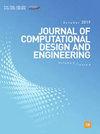The applications of hybrid approach combining exact method and evolutionary algorithm in combinatorial optimization
IF 6.1
2区 工程技术
Q1 COMPUTER SCIENCE, INTERDISCIPLINARY APPLICATIONS
引用次数: 0
Abstract
Combinatorial optimization problems have very important applications in information technology, transportation, economics, management, network communication, and other fields. Since the problem size in real-scenario application is in large-scale, the demand for real-time and efficient solving approaches increases rapidly. The traditional exact methods guarantee the optimality of the final solution, but these methods can hardly solve the problem in acceptable time due to extremely high computational costs. Heuristic approaches can find feasible solutions in a limited time, while these approaches cannot meet the demand of solution quality. In recent years, hybrid algorithms based on exact methods and heuristic algorithms show outstanding performance in solving large-scale combinatorial optimization problems. The hybridization not only overcomes the shortcomings from single algorithm but also fully utilizes the search ability for population-based approaches as well as the interpretability in exact methods, which promotes the application of combinatorial optimization in real-world problems. This paper reviews existing studies on hybrid algorithms combining exact method and evolutionary computation, summarizes the characteristics of the existing algorithms, and directs the future research.结合精确方法和进化算法的混合方法在组合优化中的应用
组合优化问题在信息技术、交通运输、经济、管理、网络通信等领域有着非常重要的应用。由于实际应用中的问题规模较大,对实时、高效的求解方法的需求迅速增加。传统的精确方法保证了最终解的最优性,但由于计算成本极高,很难在可接受的时间内解决问题。启发式方法可以在有限的时间内找到可行的解,但不能满足解的质量要求。近年来,基于精确方法和启发式算法的混合算法在求解大规模组合优化问题中表现出了突出的性能。这种混合算法不仅克服了单一算法的缺点,而且充分利用了基于种群方法的搜索能力和精确方法的可解释性,促进了组合优化在实际问题中的应用。本文综述了精确方法与进化计算相结合的混合算法的研究现状,总结了现有算法的特点,并对未来的研究方向进行了展望。
本文章由计算机程序翻译,如有差异,请以英文原文为准。
求助全文
约1分钟内获得全文
求助全文
来源期刊

Journal of Computational Design and Engineering
Computer Science-Human-Computer Interaction
CiteScore
7.70
自引率
20.40%
发文量
125
期刊介绍:
Journal of Computational Design and Engineering is an international journal that aims to provide academia and industry with a venue for rapid publication of research papers reporting innovative computational methods and applications to achieve a major breakthrough, practical improvements, and bold new research directions within a wide range of design and engineering:
• Theory and its progress in computational advancement for design and engineering
• Development of computational framework to support large scale design and engineering
• Interaction issues among human, designed artifacts, and systems
• Knowledge-intensive technologies for intelligent and sustainable systems
• Emerging technology and convergence of technology fields presented with convincing design examples
• Educational issues for academia, practitioners, and future generation
• Proposal on new research directions as well as survey and retrospectives on mature field.
 求助内容:
求助内容: 应助结果提醒方式:
应助结果提醒方式:


